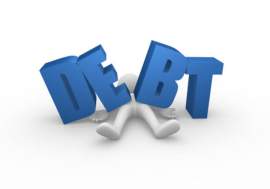
Everything to know about Debt Collection

What is a Debt?
Debt refers to something a financial or moral obligation. In general, the term will refer to assets or services owed to an individual or entity. In terms of financial obligations, debt is a means of using future purchasing power to finance a purchase now. Debt, because of this characteristic, is used to finance a number of assets, including one's home, business, vehicle or education.
Debt is created when a creditor (institution or individuals lending monies or assets) lends assets or finances to a borrower. In the majority of modern economic systems, debt will be granted with a repayment schedule. The repayment plans, affirms the borrower's promise to repay the lender, through specific due dates, interest rates and pay-off amounts.
Before a debt contract can be finalized, the borrower and the lender must agree on the manner in which the debt schedule will be satisfied. The payment plan is denominated as a sum of money, but can also be represented by goods or services owed. Repayment can be satisfied in increments over a period of time or via a lump sum
Types of Debt:
A business will use various kinds of debt to finance its operations. These different types of debt, can be categorized as such: secured and unsecured debt, 2) syndicated and bilateral debt , 3) private and public debt syndicated and bilateral debt, and 4) other debts that possess one or more of the above characteristics.
Common debt obligations are secured; in this arrangement, the lender must back their financing with a tangible asset. If the lender defaults on the repayment schedule the creditor can usurp the asset as a means of recouping their debt. A common example of a secured debt is a mortgage--the borrower's home is the collateral. In contrast, unsecured debt refers to a financial obligation, where a creditor does not have recourse to the assets of the borrower if a default is realized.
A basic loan is regarded as a simple form of debt. In a basic loan agreement the borrower will be givena lump sum--this amount is known as the principal. The borrower will agree to repay the principal in monthly installments, plus added interest charged by the lender. Common forms of these loans are student loans, credit card agreements and personal loans. In a commercial agreement, interest is calculated as a percentage of the principal sum per year.
What is Debt Collection?
Debt collection refers to the process undertaken when an individual fails to meet their respective repayment schedule attached to their loan agreement. Consumer debt collection is the term typically applied to various procedures or strategies that are utilized by the lender to recover or collect the outstanding debts owed to them.
Different strategies are implemented in debt collection; however, the process is only enacted when a creditor believes that a consumer will not honor the terms and conditions of the loan agreement.
The Debt Collection process will be initiated with the delivery of reminders and notifications. If the borrower ignores these notifications the collector will hire a debt collection agency to facilitate the repayment process.
If payment is still not received, the lender or debt collection agency will involve take the debt to small claims court--note this is only initiated for larger debts. This maneuver allows the debt to be collected through the intervention of a court system.
The debt collection proves will begin with an effort by the lender to communicate with the debtor to elucidate upon the reasons for the delay in payment. The lender will work with the borrower by offering payment plans or breaks on the total amount owed. If these attempts fail, the lender may demand the entire current due, while also closing the debtor’s account to prevent further use. If the debt is tied to a tangible asset, such as a car or home, the lender has the ability to repossess the asset.
All attempts at debt collection must be conducted in compliance with the particular debt collection laws of the respective jurisdiction; these laws must be identified in the terms and provisions section of the loan agreement.



















